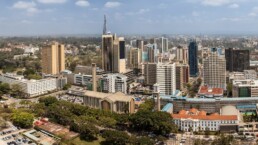Serrekunda Market in Banjul, The Gambia’s capital city. Photo credit: Kofi Jnr. Photography
Singapore is often sighted by many as a case study that The Gambia can look to emulate. Could this be due to the fact that the two countries gained full independence from the British in 1965? Or maybe because both countries have small populations living on a small land mass? It is much more complex and coincidental than that – for instance, similar to Singapore, The Gambia did not seem to have the ingredients necessary for structural transformation and economic development in 1965. Despite these and other similarities, the two countries are incredibly different today – Gambia’s GDP per capita is almost the same as Singapore’s was in 1965 ($500), while Singapore’s has skyrocketed to over $52,000. Small, underdeveloped and with little to no valuable natural resources, it seems unlikely that The Gambia can develop. However, if Singapore managed to do it, then there is some hope for mainland Africa’s smallest country.
There are several ways in which The Gambia can learn from Singapore to develop when it seems improbable. Firstly, just as Singapore is at the mouth of the Malacca Strait, The Gambia has a narrow Atlantic coastline and is a natural harbour for goods from North and South America, Europe and the rest of Africa. River Gambia also provides an efficient method for transporting goods directly into the West African region through Eastern Senegal. Following independence in 1965, Gambia’s strategic location made it a re-exportation hub for the West African region and this brought in valuable foreign exchange earnings (IMF, 2004), revenue, employment and geopolitical importance – “after 1987, the African Development Bank estimated that 40% of goods imported by The Gambia were meant for re-exportation to other countries in the sub-region”. The 1980s and 90s were particularly lucrative for the government and local business, but unfortunately, due to mismanagement and the increased competitiveness of neighbouring countries, this sector has drastically declined. To be the Singapore of Africa, the current government needs to implement policies that will revitalise this sector and invest in increasing the competitiveness of The Gambia in the region. Long-term investment in technology and vital infrastructure, such as the airport, roads, ports, bridges is a pre-requisite to turn The Gambia into a transportation and logistics hub.
Secondly, Lee Kuan Yew (Prime Minister of Singapore, 1965-1990), embraced and attracted large amounts of foreign trade and investment. Multinationals saw Singapore as a natural hub for their operations in the region for a few reasons – an educated, disciplined and healthy workforce that can work in the services industry, a favourable macroeconomic environment, modern technology and infrastructure, a beneficial tax system and business-friendly legal structure. As a result of the environment brought about by pragmatic reforms, Singapore for the past two years has consistently ranked 2nd on the World Bank’s Ease of Doing Business report. In the case of The Gambia – President Adama Barrow and his government need to make similar reforms and large investments. Key sectors requiring reforms and investment include education, manufacturing, health and infrastructure as these have a direct bearing on the ability of the nation to attract investment.
The third lesson, often ignored by economists, is the social aspect of development. As is the case with Singapore, at a certain point in their development, it was imperative that the mindset was drastically transformed. Development economists often argue that this is the most difficult part of development, as it involves using unpopular laws and tactics that may seem to infringe on the democratic and human rights of the population. Regardless, Prime Minister Lee introduced hefty fines for crimes like public defecation, chewing gum, littering and even spitting on the street. He strongly believed that without these changes in mindset and ethics, Singapore would not have developed at all or even seen economic progress. He also used other unpopular laws like the Land Acquisition Act and Prevention of Corruption Act to ensure that his government could implement the long term vision effectively and efficiently. Those two acts, if passed and enforced in The Gambia, would act as important catalysts for development. However, there is currently minimal attention on curbing corruption, implementing comprehensive land reform or even truly discouraging misbehavior. With the new democratic freedom that Gambians are enjoying, there has unfortunately been an increase in crime and civil unrest.
Lastly, having a civil service that is able to drive structural transformation is of paramount importance. The Gambian government itself requires reforming as many of the individuals who currently occupy key positions lack the integrity, skills and vision to implement development. As the Blair Institute for Global Change team in Gambia noted, “for two decades civil servants…were never empowered to challenge decisions, analyse alternative policy options, or refuse to take instructions from former President Yahya Jammeh.” Some, including myself, argue that a visionary leader is needed to create a developmental state – just as Lee Kuan Yew did. This is necessary to create a sense of national cohesion, a healthy nationalism and sense of purpose that will lead the country through the difficult stages of industrial policy formulation and structural transformation. The worry for some local development economists is that the recently released National Development Plan falls short of expectations. As it seems to point to the neoliberal donor-driven policies of ‘good governance’. As Sanjay G. Reddy points out, “this is not always wrong, but it is very frequently wholly inadequate. The focus on these priorities reflects the thinking and interests of external institutions, and in particular the perceived desirability of a reliably pro-business and pro-foreign investor economic environment.”
It is the hope of many that the President, his cabinet and other stakeholders will embrace structurally transformative policies that will see The Gambia reach its undoubted potential and become a hub for business, transport, tourism and banking in the West African region. In addition to this, we hope our leaders will be ready to make the difficult and selfless decisions, such as the ones taken by Lee Kwan Yew and his competent government to transform their nation into the powerhouse it is today in less than three decades.
The views expressed in this article are those of the author alone and not the Future Africa Forum.
The views expressed in this article are those of the author and do not necessarily reflect the views of Future Africa Forum. Future Africa Forum is a pan-African policy think-tank and policy advisory consultancy headquartered in Nairobi, Kenya.



